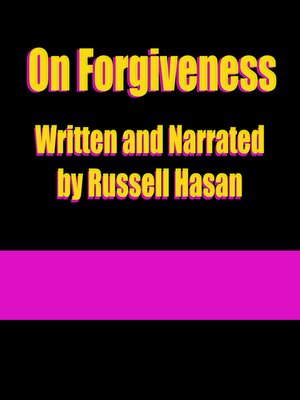
Sign up to save your library
With an OverDrive account, you can save your favorite libraries for at-a-glance information about availability. Find out more about OverDrive accounts.
Find this title in Libby, the library reading app by OverDrive.



Search for a digital library with this title
Title found at these libraries:
| Library Name | Distance |
|---|---|
| Loading... |
This is an essay on forgiveness, not in the religious sense, but in a purely secular meaning, as in, when one person forgives another person for something they did wrong. The primary focus is on self-forgiveness, where a person forgives themselves, a concept which this essay explains as "moral bankruptcy," using debts and credits and bankruptcy and economics and finance as a metaphor for the moral debts and moral credits that you owe to yourself and to others, that you owe it to yourself to be a good person, and you owe it to other people to be good to them, and, where you fail, you owe them a debt. The human brain evolved in such a way that humans tend to subconsciously seek to repay moral debts through the infliction of emotional pain, either inflicting emotional pain upon the self for debts owed to self (guilt), inflicting pain upon the self for debts owed to others (shame), or inflicting pain upon others for debts they owe to you (anger). This essay, despite being atheistic and secular in nature, does explore forgiveness in the context of areas that are commonly thought of as religious sins: lust, greed, pride, envy, and evil, as well as shame and guilt. The key central idea is that self-forgiveness, "moral bankruptcy," can help set you free from any guilt, shame, and anger that is holding you back in your life, and forgiveness will enable you to live a happier life, by giving you the confidence to act, and to achieve, with a greater resistance to fear of feeling guilt or shame if you fail, thereby tranquilizing fear of rejection or fear of failure or fear of disappointment. This theory of emotions will define honor, emotional maturity, self-esteem, and confidence, as well as explaining all of the seven major emotions: happiness, sadness, love, fear, guilt, shame, and anger. This book is cold, logical, no-nonsense wisdom about forgiveness, and is not mere wishy-washy empty generalities like most self-help books.







